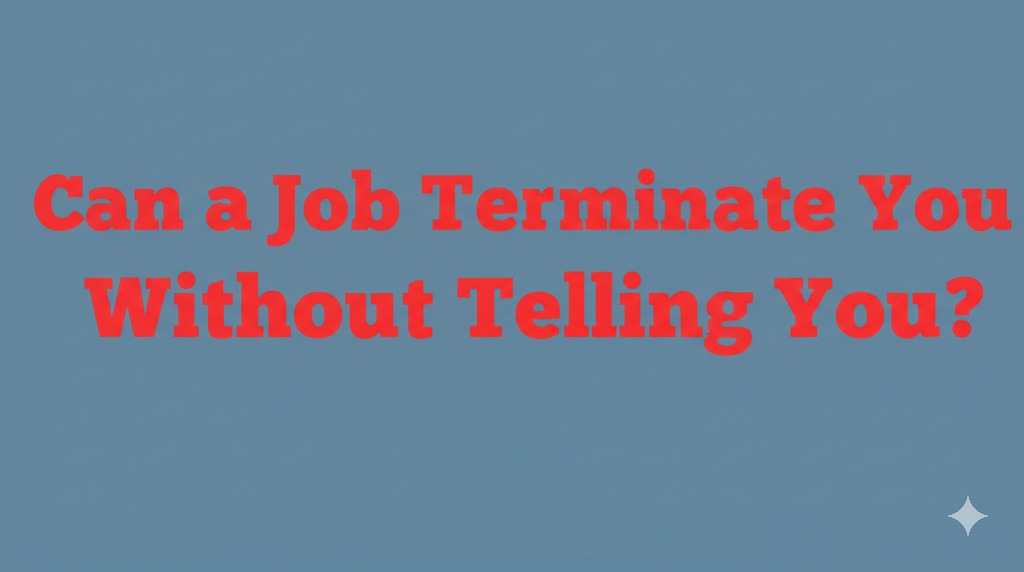
Imagine showing up to work, only to find out your access card doesn’t work—or worse, you’ve been removed from the schedule without a word. It’s a scenario no employee wants to face, but it raises a serious question: Can a job legally terminate you without telling you first?
In this article, we’ll break down everything you need to know about unexpected job terminations—from employment laws and company policies to your rights as an employee. Whether you’re currently employed, recently let go, or just want to be informed, this guide will help you understand where you stand.
Understanding At-Will Employment
What Is At-Will Employment?
In the U.S., most employees work under “at-will” employment, which means either the employer or the employee can terminate the relationship at any time, for any reason, or even for no reason at all—with or without notice.
However, just because it’s legal doesn’t mean it’s always fair or appropriate.
States With Exceptions to At-Will Rules
Some states place limits on at-will employment. For example:
- Montana requires just cause for termination after a probationary period.
- Other states recognize exceptions for public policy violations, implied contracts, or bad faith terminations.
Always check your state’s labor laws to see if exceptions apply.
Can You Be Fired Without Being Told?
Legally, Yes—In Many Cases
Technically, yes—you can be terminated without prior notification. There’s no federal law that requires employers to tell you ahead of time that you’re being let go, especially if you’re an at-will employee.
However, firing someone without telling them at all (i.e., you never receive any notice, documentation, or conversation) can be problematic.
Common Scenarios Where This Happens
- You stop receiving work or shifts without explanation.
- You’re locked out of systems or your email stops working.
- HR or your manager “ghosts” you, never officially confirming termination.
In these situations, it’s crucial to document everything and try to get written clarification from your employer.
When Employers Must Provide Notice
WARN Act: For Mass Layoffs and Closures
The Worker Adjustment and Retraining Notification (WARN) Act requires certain employers to give 60 days’ notice before large-scale layoffs or plant closures.
This applies if:
- The company has 100+ full-time employees, and
- 50+ employees are laid off at a single site.
If you’re laid off as part of a mass downsizing and didn’t get a heads-up, your employer may have violated this law.
Employment Contracts or Union Agreements
If you have a written contract, it may include termination clauses outlining notice periods or specific procedures.
Similarly, unionized workers are often protected by collective bargaining agreements that require cause and advance notice before termination.
What Should You Do If You’re Let Go Without Notice?
1. Confirm Your Employment Status
If you suspect you’ve been fired but haven’t been officially told:
- Contact your supervisor or HR department for clarification.
- Ask for a termination letter or email for your records.
2. Request Final Pay and Benefits Info
In most states, you’re entitled to:
- Final paycheck (with unused PTO if applicable)
- COBRA health insurance options
- Unemployment benefits, if eligible
Be sure to collect this information promptly to avoid delays.
3. Know Your Rights
You cannot be terminated based on:
- Race, gender, religion, age, or disability
- Whistleblower activity
- Filing for workers’ compensation
If you believe your firing was discriminatory or retaliatory, speak with an employment lawyer or contact the EEOC (Equal Employment Opportunity Commission).
How to Protect Yourself in the Future
Keep a Paper Trail
Save copies of:
- Performance reviews
- Work emails
- Official communication from managers
This documentation could be crucial if you need to contest a termination or file for unemployment.
Clarify Expectations
Ask about:
- Notice policies
- Termination procedures
- Disciplinary steps
Knowing your company’s policies can help you spot red flags early.
Conclusion: Communication Matters, But It’s Not Always Guaranteed
While it might feel unfair or shocking, yes—your job can technically terminate you without formally telling you, especially in at-will states. But whether or not it’s right is another story.
If you’re in this situation, don’t panic. Take action to clarify your employment status, gather documentation, and understand your legal options. And if you’re job hunting again, look for employers that value clear communication and transparency.

Andre Cuevas provides career insights, job search strategies, and professional advice to help individuals navigate the job market and achieve their career goals.





